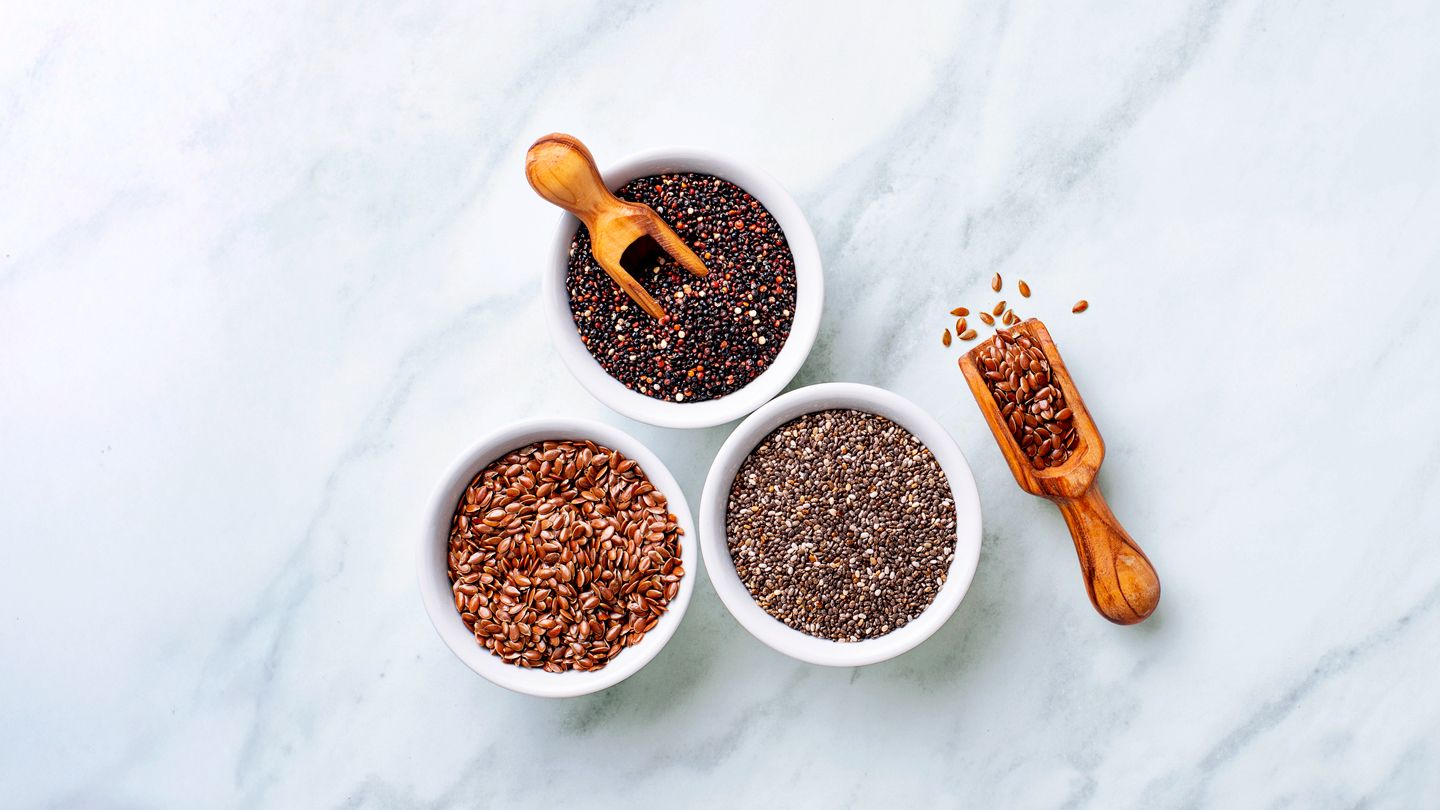They may be small, but seeds pack a nutritional punch. “Seeds are rich in fiber, healthy fats, and plant-based protein, making them a great addition to a balanced diet,” says Jenna Gorham, RD , a registered dietitian in Bozeman, Montana. Learn about the healthiest seeds on the market and how to incorporate them into a healthy eating plan.
7 Top Seeds to Choose Seeds to Choose The following seven seeds are nutrient powerhouses with unique health benefits. Here’s what registered dietitians have to say about each one. 1. Chia Seeds Chia seeds are high in omega-3 fatty acids and fiber (10 grams [g] per ounce), two nutrients that offer benefits for heart health and bowel regularity, Gorham says. Fiber, for one, helps keep your digestive system moving and adds bulk to your stool. It may also reduce low-density lipoprotein (LDL) cholesterol , the type of cholesterol that’s associated with an increased risk of heart disease and stroke .e60dc2a1-f33c-4a05-9b50-8e3e8e597629e28fd078-8d9c-4c2c-9792-4113fe4651f7 Omega-3 fatty acids are crucial for the health and function of all the cells in your body and may protect against heart disease. Because your body can’t produce enough omega-3 fatty acids on its own, you must get them from foods.e60dc2a1-f33c-4a05-9b50-8e3e8e597629e4f73a98-26b7-4bc6-be54-e574f0638d71 A 1 ounce (oz) serving of chia seeds also contains 138 calories, 4.7 g of protein , and 9 g of fat.e60dc2a1-f33c-4a05-9b50-8e3e8e597629aac1579e-48ee-4807-be31-24e82e191a80 When mixed with liquid, chia seeds absorb as much as 12 times their weight in water, creating a thick, gel-like texture that works well as a pudding.e60dc2a1-f33c-4a05-9b50-8e3e8e59762979f68799-ce0e-4a89-bdd1-2208d3237ae6 2. Flaxseeds Whether mixed into oatmeal or baked into whole-grain bread, flaxseed deserves a spot in your kitchen cabinet. “Flaxseeds are a top plant source of the omega-3 fatty acid alpha-linolenic acid (ALA),” says Stephanie Crabtree, RD , a registered dietitian in Venice, Florida. An ounce contains more than 6 g of ALA, which is nearly four times the minimum amount recommended by the National Institutes of Health for men (1.6 g per day), and more than five times the minimum amount recommended for women (1.1 g per day).e60dc2a1-f33c-4a05-9b50-8e3e8e59762986ada91a-7971-46fb-8300-770c69e0c412 Along with the other types of omega-3s — eicosapentaenoic acid (EPA) and docosahexaenoic acid (DHA) — ALAs might help lower your risk of heart disease, Alzheimer’s disease and other forms of dementia , and some cancers.e60dc2a1-f33c-4a05-9b50-8e3e8e597629e4f73a98-26b7-4bc6-be54-e574f0638d71 You’ll also score 150 calories, 11.8 g of fat, 5.1 g of protein, and 7.6 g of fiber per ounce.e60dc2a1-f33c-4a05-9b50-8e3e8e5976299c599014-bfb6-454b-97d6-cd6cd6a03c7f 3. Hempseeds With 155 calories, 13.7 g of fat, 8.8 g of protein, and 1.1 g of fiber per 1 oz serving, hempseeds are a fun way to add some plant-based protein to your diet. With almost 9 g per serving, they’ve got more protein than any other seed on this list, which makes them a great addition to carb-rich breakfast options like smoothies or oatmeal.e60dc2a1-f33c-4a05-9b50-8e3e8e597629683db2e9-bc2f-4584-a101-49ccb712edfe With 196 milligrams (mg) of magnesium per ounce, enough to meet about half your daily needs, hempseeds are also the best source of this essential micronutrient on this list. Magnesium supports muscle function, healthy blood pressure, blood sugar regulation, and a steady heartbeat. It’s also associated with relaxation, since it can help regulate your stress hormones.e60dc2a1-f33c-4a05-9b50-8e3e8e59762936c98c41-b0db-46bf-955c-b7c11ff4e562 You can easily add hempseeds to baked goods for extra nutrition, or sprinkle them over yogurt for a subtle crunch. 4. Pumpkin Seeds An ounce of roasted pumpkin seeds delivers 163 calories, 14 g of fat, 8.5 g of protein, and 1.8 g of fiber. That amount also delivers 2.2 mg of zinc , which is 20 percent of the daily value (DV).e60dc2a1-f33c-4a05-9b50-8e3e8e597629065d7f86-e2dc-4786-a042-5ed2909eb7a7 Research shows that zinc plays a key role in immune function, and adequate intake can help fight viruses, bacteria, and other diseases.e60dc2a1-f33c-4a05-9b50-8e3e8e597629cf666299-bebf-4d77-a99f-23119d176781 “Pumpkin seeds also have high antioxidant content, which helps protect cells from oxidative stress,” Gorham says. Oxidative stress happens inside your body when there are too many free radicals (a natural by-product of metabolism, but also created by environmental factors like stress, sun exposure, and smoking) and not enough antioxidants (compounds found in foods that help neutralize these free radicals). Oxidative stress may increase your risk of many diseases, including cancer , arthritis, and heart and kidney disease .e60dc2a1-f33c-4a05-9b50-8e3e8e59762901a904f3-d949-4a96-9a6c-8d5705cfaee5 To include pumpkin seeds in your diet, try sprinkling them on salads or soups, or enjoy them solo as a protein- and zinc-packed snack. 5. Sunflower Seeds If you’re looking for foods that could support skin health, sunflower seeds are a good bet, Gorham says. They’re one of the best food sources of vitamin E, offering 7.4 mg (49 percent of DV) per oz.e60dc2a1-f33c-4a05-9b50-8e3e8e59762992baa05a-ee9f-4eb4-a9b7-f33776abf645 Vitamin E may help protect the skin against sun damage, while also supporting eye health and helping prevent blood clots.e60dc2a1-f33c-4a05-9b50-8e3e8e59762938dfe245-7a9c-42f2-b0cc-86180c9fa895 One ounce of toasted sunflower seeds without shells also has 175 calories, 16 g of fat, 4.9 g of protein, and 3.3 g of fiber.e60dc2a1-f33c-4a05-9b50-8e3e8e597629829a8980-a5aa-426c-a8f3-df4154941c1c Sunflower seeds make a good snack straight out of the bag, but sunflower seed butter made from ground seeds is another fun way to eat them. “It’s a great option for those that suffer from a peanut or tree nut allergy,” says Julia Stevens, MPH, RDN , a registered dietitian-nutritionist and the owner of Active Nutrition in Farmington Hills, Michigan. 6. Quinoa While often mistaken for a grain because of how it’s prepared and eaten, quinoa is actually a seed. “Naturally gluten-free, quinoa can serve as a wonderful whole grain replacement in gluten-free diets,” Gorham says. With 222 calories, 3.6 g of fat, 8.1 g of protein, and 5.2 g of fiber per cooked cup, it’s lower in fat than other seeds on the list, despite having a larger serving size.e60dc2a1-f33c-4a05-9b50-8e3e8e597629fa06408b-7f7b-40a0-8c07-c83f332ec708 Quinoa is also a good source of B vitamins like thiamine (B1), riboflavin (B2), and pyridoxine (B6), which help the body convert food into energy, support nerve function and brain health, and play a role in hormone production.e60dc2a1-f33c-4a05-9b50-8e3e8e5976294253c8b2-d0b9-4812-8a5d-ae7d825ef4af 7. Sesame Seeds From bagels to stir-fries to hummus, sesame seeds are a star ingredient in many iconic dishes. They’re also an excellent nutritional choice: “Sesame seeds are rich in calcium, magnesium, manganese, zinc, and B vitamins,” Gorham says.e60dc2a1-f33c-4a05-9b50-8e3e8e597629cf666299-bebf-4d77-a99f-23119d176781 Manganese is essential for metabolism, bone formation, reproduction, and immune function, and an ounce of sesame seeds delivers 9 percent of the recommended daily value.e60dc2a1-f33c-4a05-9b50-8e3e8e5976291375c5c3-b386-4eb5-8704-35619f0a577a Calcium is a building block of bones and teeth, and supports the proper function of blood vessels, muscles, nerves, and hormones. An ounce of sesame seeds gives you 6 percent of the recommended daily value. Note that calcium in sesame seeds is not as readily available as the calcium in dairy products, meaning you don’t absorb as much.e60dc2a1-f33c-4a05-9b50-8e3e8e597629a09218ab-debb-4886-b496-db96c6e4ad75 Plus, sesame seeds are loaded with the antioxidant compounds sesamin, sesamolin, and sesaminol, which may help keep cholesterol levels in check and support brain health with age.e60dc2a1-f33c-4a05-9b50-8e3e8e597629ebf5631d-91c4-4d22-8f35-d03feeb1fc3f Sesame seeds provide 160 calories, 13.6 g of fat, 4.8 g of protein, and 4 g of fiber per oz.e60dc2a1-f33c-4a05-9b50-8e3e8e597629184d83d9-df1d-4128-b55b-9058ccb84355
How to Add Seeds to Your Diet: 5 Tips Tips “Seeds can be easily incorporated into everyday meals to enhance both flavor and nutrition,” Crabtree says. Here are some tips for how to add them in. Stick to an ounce per day. Because seeds are relatively high in calories, it’s best to eat no more than 1 oz most days. But you may be able to bump it up to 2 oz if you follow a plant-based diet that’s low in other fat sources.e60dc2a1-f33c-4a05-9b50-8e3e8e597629b3525494-7f37-45b2-a1a8-0535d898fa69 That’s roughly a ¼ cup, or the size of a small handful. Use them as a garnish. Seeds are good for more than snacking; they also make an excellent topping for your favorite recipes. “I love adding seeds to salads, pasta dishes, avocado toast, oatmeal, and even as a garnish for soups,” Crabtree says. Bake them in. Some seeds, like flaxseed, can be used as a dry ingredient in baked goods. “Find a smooth-milled flaxseed and add a scoop to your muffin or pancake mix to increase the fiber and protein naturally,” Stevens says. You can also add whole seeds to muffins, quickbreads, and even cookies. Just steer clear of chia seeds unless the recipe specifically calls for them; they soak up lots of water and can change the consistency of a dish. Try seed butters. “Seed butters can be just as nutritious as the seeds themselves, though there may be some minor loss of fiber during processing,” Gorham says. “They offer the same healthy fats, protein, and essential vitamins, and can be easy to incorporate into meals like smoothies or spreads.” Sunflower seed butter is widely available and makes a great substitute for peanut butter; tahini, made from ground sesame seeds, can be added to dips or whisked into salad dressings to add creamy texture and a nutty, slightly bitter flavor. Store in a cool, dry place. Seeds are a pantry staple — and that’s precisely where you should keep them. Store seeds in a cool, dry place, like an airtight container, Gorham says. If they aren’t exposed to heat, light, or moisture, most seeds will last for at least several months, and some will last for years. The Takeaway Seeds offer a good source of healthy fats, fiber, protein, and several key vitamins and minerals. The healthiest seeds include chia seeds, flaxseeds, hempseeds, pumpkin seeds, sunflower seeds, sesame seeds, and quinoa. Stick to an ounce of seeds per day to get the nutritional benefits without too many calories.
Read the full article here
Leave a comment




